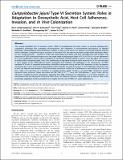Campylobacter jejuni Type VI Secretion System: Roles in Adaptation to Deoxycholic Acid, Host Cell Adherence, Invasion, and In Vivo Colonization
Author(s)
Lertpiriyapong, Kvin; Gamazon, Eric R.; Feng, Yan; Park, Danny S.; Pang, Jassia; Botka, Georgina; Graffam, Michelle E.; Ge, Zhongming; Fox, James G; ... Show more Show less
DownloadLertpiriyapong-2012-Campylobacter jejuni.pdf (1.373Mb)
PUBLISHER_CC
Publisher with Creative Commons License
Creative Commons Attribution
Terms of use
Metadata
Show full item recordAbstract
The recently identified type VI secretion system (T6SS) of proteobacteria has been shown to promote pathogenicity, competitive advantage over competing microorganisms, and adaptation to environmental perturbation. By detailed phenotypic characterization of loss-of-function mutants, in silico, in vitro and in vivo analyses, we provide evidence that the enteric pathogen, Campylobacter jejuni, possesses a functional T6SS and that the secretion system exerts pleiotropic effects on two crucial processes – survival in a bile salt, deoxycholic acid (DCA), and host cell adherence and invasion. The expression of T6SS during initial exposure to the upper range of physiological levels of DCA (0.075%–0.2%) was detrimental to C. jejuni proliferation, whereas down-regulation or inactivation of T6SS enabled C. jejuni to resist this effect. The C. jejuni multidrug efflux transporter gene, cmeA, was significantly up-regulated during the initial exposure to DCA in the wild type C. jejuni relative to the T6SS-deficient strains, suggesting that inhibition of proliferation is the consequence of T6SS-mediated DCA influx. A sequential modulation of the efflux transporter activity and the T6SS represents, in part, an adaptive mechanism for C. jejuni to overcome this inhibitory effect, thereby ensuring its survival. C. jejuni T6SS plays important roles in host cell adhesion and invasion as T6SS inactivation resulted in a reduction of adherence to and invasion of in vitro cell lines, while over-expression of a hemolysin co-regulated protein, which encodes a secreted T6SS component, greatly enhanced these processes. When inoculated into B6.129P2-IL-10[superscript tm1Cgn] mice, the T6SS-deficient C. jejuni strains did not effectively establish persistent colonization, indicating that T6SS contributes to colonization in vivo. Taken together, our data demonstrate the importance of bacterial T6SS in host cell adhesion, invasion, colonization and, for the first time to our knowledge, adaptation to DCA, providing new insights into the role of T6SS in C. jejuni pathogenesis.
Date issued
2012-08Department
Massachusetts Institute of Technology. Department of Biological Engineering; Massachusetts Institute of Technology. Department of Biology; Massachusetts Institute of Technology. Division of Comparative MedicineJournal
PLoS ONE
Publisher
Public Library of Science
Citation
Lertpiriyapong, Kvin et al. “Campylobacter Jejuni Type VI Secretion System: Roles in Adaptation to Deoxycholic Acid, Host Cell Adherence, Invasion, and In Vivo Colonization.” Ed. Stefan Bereswill. PLoS ONE 7.8 (2012): e42842.
Version: Final published version
ISSN
1932-6203